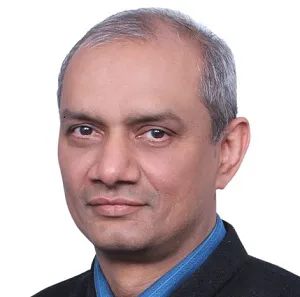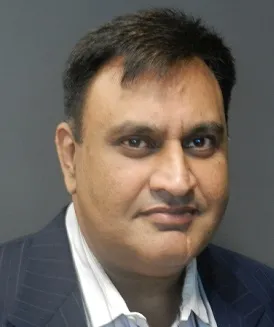Micro-finance lender AYE Finance raises 70cr in funding, plans to disburse 400cr worth of loans by 2018
On Monday, Indian micro, small and medium enterprises (MSMEs) lender AYE Finance announced raising funds worth $10 million (Rs 70 Crore) in a Series B round led by LGT IV (which invested close to Rs 30 Crore), along with existing investors SAIF Partners and Accion.
The funds raised will be used for expanding the MFI's (Micro Finance Institution) branch coverage as well as strengthening their technology for underwriting loans. A part of the funding might also be used for lending purposes.

In February last year, the firm had raised $1 million in investments from SAIF Partners and Accion.
At present, the firm claims to have 31 lending branches, of which 29 are stationed in the northern region and only two in the South (in Bengaluru and Tumkur). According to co-founder and managing director Sanjay Sharma, the firm plans to aim at the southern and western markets for expansion. He says,
Given that our customers are not digitally savvy and the origination of a loan, thus, starts through a branch, we would be investing in spreading the network of these branches. Further, we also have to work on our e-CRM system, which works like a workflow and has the ability to take care of scanned eKYC. And lastly, a major part of our efforts are being directed into strengthening the credit underwriting piece. We also want to invest a part of the funding in setting up the data warehouse, data methodology and testing of those models.
Further, according to the founder, while underwriting a loan, each industry cluster internally parameterised, with each credit case mapped against industry averages of that particular cluster, while making the decision to disburse a given loan. Sanjay adds,
While doing the research before starting up, we did a detailed survey of all industries under MSMEs, trying to understand their margins, challenges and even cash flows in these clusters. And these estimates aren’t very different for new customers approaching us for a loan.
Standing against the tide
Having started in July 2013, the idea for Sanjay and his fellow co-founder Vikram Jetley was to do something for the unbanked and underprivileged. Having worked with financial services provider Ujjivan, they came across the opportunity to work on microenterprises.
According to the government, there is an estimated gap of five lakh crore rupees of working capital in this segment. This is also due to the perception that the poor would have high default rates.
However, for Sanjay and Vikram, the reasoning was a little different. Their hypothesis was that since the poor don’t have many avenues of funding, they would protect an organised player in the space by making sure that they paid the loan in the due time.
Today, the institution has disbursed close to Rs 100 crore worth of loans, across a network of 10,000 customers. Over the last year, the company claims to have grown five to ten percent in terms of booksize, and plans to reach Rs 175-200 crore in disbursement this fiscal year.

Sanjay also tells us that their loans, on an average, start at Rs 50,000 and can go all the way up to Rs 3 lakh. However, in certain cases, the lending has gone up all the way to Rs 25 lakh.
The company also claims to have an NPA (Non-Performing Assets) rate below one percent, with a 90-day delinquency. To give one a perspective, housing finance companies’ NPAs are usually between 3-14 percent.
The firm lends working capital to customers working across 40 different industry clusters, from manufacturers of shoes and sports equipment to furniture and readymade garment. AYE Finance is focused solely on micro and small enterprises with Rs 10 lakh to Rs 1 crore in turnover every year.
Giving a slight peak at the revenue front, Sanjay says that the company is running even this year, owing to the last years’ losses, and will be profitable by next year.
According to him, the main challenge in the industry is to keep the operating costs low. He says that AYE Finance lends credit to customers at an interest rate of anywhere between 21 percent (with collaterals) and 28 percent (without collaterals).
In the future, the firm aims to:
- Disburse loans worth Rs 400 crore in value by FY 2018
- Scale up to 40 branches by March 2017 and thereafter to 75 branches in financial year 2017-18
- Evolve into an even more digitally capable platform allowing e-KYC and digital contracting capabilities
Investor Speak
Speaking on the investment, Vishal Sood, Partner with SAIF Partners, says,
“We believe that AYE Finance has developed the right set of capabilities to profitably serve the underserved space of MSME finance. Its consistent performance is a testimony to its unique business model for sourcing and evaluating borrowers efficiently and delivering superior value to its MSME customers.”
Meanwhile, Vikas Raj, Managing Director at Accion Venture Lab, says,
“AYE Finance is one of the most exciting companies in our portfolio of global investments, focused on using innovative underwriting and acquisition methods to serve micro and small enterprises. Through its unique cluster-based process, technology and high quality team, AYE is benefitting the large number of micro and small enterprises that are the engine of growth for the Indian economy.”
Demonetisation and the industry
However, one question does seem prominent on the landscape. With the recent demonetisation, how are these businesses going to be impacted? Sanjay says,
The businesses that we work with tend to be paper cash-intensive, which might cause a certain impact for sometime. Therefore, due to the scarcity of cash, we foresee a delay in payments. But going by the overall sentiment garnered by our customers, they seem resilient.

Sanjay further predicts that during this time, the firm’s NPA might reach two percent; that is still, however, a low rate when compared to the industry average.
Thus, to put it in a nutshell, with the demonetisation, there are chances of delinquency or overdues increasing in the next couple of months. Further, the lending business might see a temporary fall of about 10-20 percent in that time, according to Sanjay. But he’s hopeful that there will be recovery in the next three months after.
What's more, the silver lining might be that the cost of funds could go down for these MFIs, due to an already existing flow of cash capital for banks. This might also lead to a drop in interest rates, hence reducing the cost of funds for MFIs like AYE Finance.
Further, this drop in interest rates might also result in higher loan disbursement, with banks wanting to partner with MFIs like AYE Finance to increase their coverage. Sanjay says,
The biggest challenge in the MFI industry is to keep the operating cost low, which might be a big bottleneck for banks to have completely entered the MFI arena. This leaves ample opportunities for partnerships, and we’d ideally want our customers through these banks.
According to a 2013 report of the National Sample Survey Office, only four percent of the 57.7 million small businesses have access to formal finance from the banking sector. Moreover, a large number of borrowers at the mercy of economic swings have deterred banks from fully exploiting this market.
Website: www.ayefin.com







